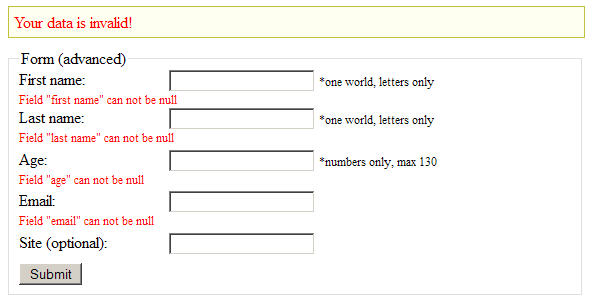ApPHP DataValidator
- Last Update
- 26 March 2013
- Regular License
- $8
- Extended License
- $40
- Sales
- 2
Product Description ApPHP DataValidator is a simple lightweight tool useful for primary general data checks. It handles numbers, strings, emails, URLs. A range of parameters is provided for a wide variety of different verifications. All parameters are used optionally and could be switched on and off for every specific value.
The DataValidator component accepts an array or an object as data container, so it can be easily used to check values got by HTTP request, obtained from database, parsed XML or CSV file or any other source as soon as data are in correct format (array(‘key’=>’value’)). Error handling is made easy and flexible. If validation process fails, you can either obtain a generated error-message or use error-details for logging and user informing in you own style.
Data validation is typically used to make sure that incoming data has a certain quality/value. The validation process is running on a server-side.
This component may be used
For database data validation For check of function parameters or returned values validation For web forms data validation etc.
Product Features
Checks numbers for type (integer, float, numeric), range, special values (null) Checks hexadecimal numbers Check float numbers for precision, allows to use comma as decimal separator in numeric numbers Checks strings for size, pointing and spaces availability Checks strings with any optional set of meta-characters or a regular expression Allows to switch Unicode support on and off Checks URL for correct format Checks e-mail for correct format Checks SSN for correct format OneOfSet validation type Checks phone number for correct format. Optionally cell-phone number can be checked Checks postcode for correct format. Optionally country-specific postcode can be checked Checks string or email for confirmation field or value match Can be stopped after the first validation failure or kept through all values Returns errors in a convenient way Works with array of HTTP request as a default data source Accepts any data source in simple, natural for forms and data-base rows view Accepts JSON as data source Accepts XML as data source
Additional Info:
Installation Guide: Click to View
Getting Started: Click to View
ChangeLog: Click to View
Forum: Click to View
